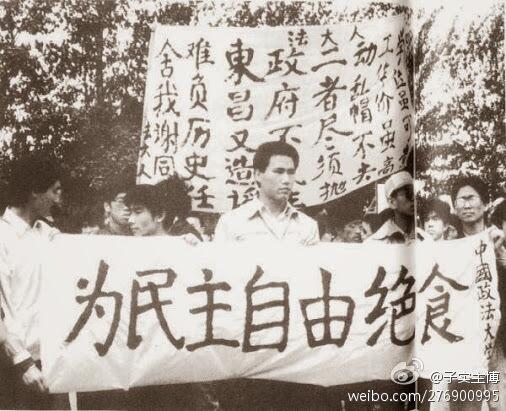Reuters’ Sui-Lee Wee reports that prominent rights lawyer Pu Zhiqiang was placed in criminal detention on Tuesday, after attending a weekend gathering to mark the looming 25th anniversary of the June 4th 1989 crackdown. Several others who were at the meeting have also been detained or questioned.
Pu Zhiqiang, a leading free-speech lawyer, has represented many well-known dissidents, including artist Ai Weiwei and activists of the “New Citizens’ Movement”, a group that has urged Chinese leaders to disclose their assets.
The move to formally detain Pu underscores the sensitivity of Chinese leaders to any form of criticism ahead of the 25th anniversary of China’s crackdown on the demonstrations around Tiananmen Square in Beijing on June 4, 1989.
[…] At least five dissidents and professors have disappeared since attending the meeting, held to commemorate the 1989 crackdown as well as “explore its implications and consequences and call for an investigation into the truth of June 4,” said Hua Ze, a human rights activist.
In a statement, Beijing police said they had “criminally detained” Pu on a charge of “causing a disturbance” and were holding him at the Beijing No.1 Detention Centre. [Source]
Human Rights Watch’s Maya Wang commented on Twitter:
Confirmed: Pu Zhiqiang under criminal detention for "creating a disturbance." Disturbing to detain someone so influential a full month ahead
— Maya Wang 王松蓮 (@wang_maya) May 6, 2014
Unusual & alarming move by authorities 2 detain someone so influential instead of putting him under house arrest like in previous years.
— Maya Wang 王松蓮 (@wang_maya) May 6, 2014
The use of disturbance charges in political cases has become increasingly common in recent months. They may not lead to trial for Pu, however: police appear to have been using 30-day criminal detentions as a convenient means of holding activists and petitioners even in cases where there is no intention of eventual prosecution. Waiting until Tuesday to begin his detention will allow them to hold him until June 5th, the day after the anniversary.
China Change has posted a list of attendees at Saturday’s seminar, and of those who have subsequently faced questioning or detention. Last week, The Telegraph’s Malcolm Moore described other measures taken by authorities ahead of the anniversary, including the apparent detention of veteran journalist Gao Yu. In a potent illustration of the date’s sensitivity, Fei Chang Dao pointed that Baidu’s Wikipedia-like Baike site has no entry for the year 1989, while at PRI’s The World, Matthew Bell reported that even Chinese students in the U.S. feel they must approach the subject with caution.
In her report at Reuters and on Twitter, Sui-Lee Wee highlights a 2006 essay by Pu Zhiqiang on his own involvement in the 1989 protests, and his efforts to commemorate the ensuing crackdown despite official obstruction. From The New York Review of Books:
I recall the early hours of June 4, 1989. The few thousand students and other citizens who refused to disperse remained huddled at the north face of the Martyrs’ Monument in Tiananmen Square. The glare of fires leaped skyward and gunfire crackled. The pine hedges that lined the square had been set ablaze while loudspeakers screeched their mordant warnings. The bloodbath on outlying roads had already exceeded anyone’s counting. Martial law troops had taken up their staging positions around the square, awaiting final orders, largely invisible except for the steely green glint that their helmets reflected from the light of the fires. It was then that I turned to a friend and commented that the Martyrs’ Monument might soon be witness to our deaths, but that if not, I would come back to this place every year on this date to remember the victims.
[…] If I just slouch along through life, taking the easy route, what do I say to the spirits of those murdered “rioters” of seventeen years ago? And if everyone forgets, are we not opening the door to future massacres? Our Tiananmen generation is now in middle age; we are in positions where we can make a difference. Do we not want to? […] [Source]
浦志强 1989 pic.twitter.com/PQTemqjVka
— 重回天安门 (@backtotiananmen) May 6, 2014








